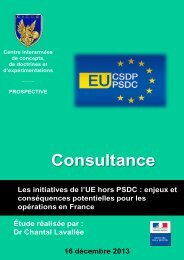Conference
science-research-bulletin-2013-conference
science-research-bulletin-2013-conference
You also want an ePaper? Increase the reach of your titles
YUMPU automatically turns print PDFs into web optimized ePapers that Google loves.
EUROPEAN POLICE SCIENCE AND RESEARCH BULLETIN<br />
SPECIAL CONFERENCE EDITION<br />
GLOBAL POLICING AND<br />
THE CONSTABULARY ETHIC<br />
James Sheptycki<br />
Canada<br />
Ben Bowling<br />
United Kingdom<br />
Keywords: Global Policing, Policing Subculture, Global Governance, Constabulary Ethic, Police Science<br />
Abstract: This paper brides a gulf between the Enlightenment idea of a science of policing and<br />
contemporary police techno-science and asks questions about how such ideas can be brought into<br />
accord with notions of ‘good policing’. Policing has been central to the art of governance since the<br />
modern period began more than two hundred years ago. Policing under transnational conditions<br />
presents enormous challenges. The system of global governance is highly complex and this is especially<br />
evident with regard to the conceptual field of policing. Globally speaking, police legitimacy is projected<br />
through a functionalist rhetoric predicated on certain folkdevils and suitable enemies, to which strong<br />
police measures are said to be the only answer. The original science of police was deeply imbued with<br />
normative thinking, since it was concerned with notions of the general welfare of society and state. In<br />
present times, police science is being reduced to experimental criminology and crime science.<br />
This paper aims to affect thinking within the occupational world of policing by pointing to the idea of<br />
a Constabulary Ethic as an appropriate short-hand term for a broader normative standpoint for global<br />
policing. Empirical research is a necessary part of doing good police work, but it is not sufficient. Good<br />
science, like good governance, is possible only in an open society that fosters a dialogue that includes<br />
all its members. This essay aims to show the imperative of developing an ethical standpoint (called the<br />
Constabulary Ethic) for the system of subcultural meanings that inscribe the lifeworld of global policing.<br />
INTRODUCTION<br />
Global policing and the global system are<br />
synchronous, homologous and heteronymous.<br />
As such, the study of global policing concerns<br />
much more than international law enforcement.<br />
Coming to terms with the nature and practice<br />
of global policing involves understanding the<br />
global system. For the police agents who do<br />
this work, the most important question should<br />
be how to police the global system well. It is<br />
now common to speak in terms of transnational<br />
networks of police agents in a globalising world.<br />
This essay is part of a continuing development<br />
of the theoretical language for talking about the<br />
phenomenon of global policing (Bowling and<br />
Sheptycki, 2012). What we do here is provide a<br />
sense of where the science of policing has come<br />
from and where it has arrived. In a sense the<br />
essay aims to bridge an historical gap between<br />
the original modern conception of the science of<br />
policing and 21st century police techno-science.<br />
This inevitably raises normative questions since,<br />
in trying to think about policing in scientific<br />
terms, over time questions arise about how to<br />
‘do it better’, which require an evaluation of<br />
what ‘it’ is. This should orientate theories about<br />
global policing around the central question:<br />
‘what is good policing?’. We are interested to<br />
encourage exploration into what a practical<br />
ethics of policing science on a global (or even<br />
planetary) basis might look like. The notion of<br />
the Constabulary Ethic is, we argue, absolutely<br />
crucial because, instead of narrowly focusing on<br />
questions of the measurability of effectiveness,<br />
efficiency and economy in policing work, it<br />
encourages questions about the relationship<br />
( 1 ) I would like to thank Paul Rock, Ben Bowling, Auke van Dijk, Frank Hoogewoning, Steve Tong and Eduardo Manuel Ferreira<br />
for their useful comments relating to this paper.<br />
9





